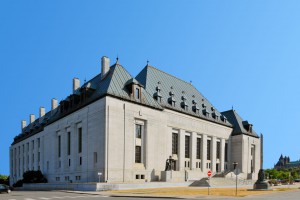Supreme Court of Canada: The Canadian Supreme Court recently had to decide on an important issue of administrative law pertaining to how far the monopoly on legal representation extends. The question was whether the Minister of Employment and Social Solidarity could be represented by a person who is ‘not an advocate’ before the Administrative Tribunal of Québec. In cases relating to social aid in which the two parties were the Minister (Employment and Social Solidarity) and individuals, the Minister had applied for a review of the decisions by the Administrative Tribunal of Quebec (ATQ) and the motions for the same were prepared and drafted by a person who is not an advocate. Reacting to this, the opposite party brought motion to dismiss the case stating that the Minister’s written proceedings had not been prepared and drawn up by a practising advocate entered on the Roll of the Order of the Barreau du Québec (Bar of Quebec).
The Administrative Tribunal of Québec had concluded that its enabling statute authorizes person who is not advocate to prepare and draw up written proceedings in name of Minister of Employment and Social Solidarity and also that that power is not in conflict with Act respecting the Barreau du Québec. However, the Court in appeal had reversed the decision of Tribunal.
The Court noted down that Section 128 of the Act respecting the Barreau du Québec provides that certain activities, including preparing and drawing up motions and other written proceedings, are the “exclusive prerogative” of advocates and solicitors. It reserves “pleading or acting” before courts or tribunals to practising advocates and at the same time, Section 102 of the Act respecting administrative justice grants the Minister the right to “be represented by the person of his . . . choice before the social affairs division” of the Administrative Tribunal of Quebec. The Bench consisting of nine judges with Cote, J. in dissent on observing this ascertained that the main issue that they need to decide upon is whether the Minister’s right to “be represented” that is provided for in Section 102 would include the preparation and drawing up of written proceedings or motions intended for use before the ATQ’s social affairs division.
The Court observed that the Act respecting the Barreau du Québec has a close connection to the ATQ’s function and Section 128(2)(a)(5) of that Act, which grants the Minister the right to be represented by a person who is not an advocate, refers expressly to the ATQ and establishes a procedural rule that applies in proceedings before it. The Court further states that the conflict is further resolved by Section 129(b) of the Act respecting the Barreau du Québec, which provides that Section 128 of that Act neither limits nor restricts rights that are specifically defined and granted to any person by any public or private law and therefore, Minister’s right under Section 102 justice to be represented by a person of his or her choice is thus not diminished in the least by Section 128 of the Act respecting the Barreau du Québec.
The majority opinion was that the reasonableness standard must be presumed to apply here stating that the issue to be considered entails the interpretation of Section 102 of the Act respecting administrative justice, which is in the ATQ’s enabling statute and which sets out procedural rules that apply in proceedings before it.
The judgment states that the presumption in favour of the reasonableness standard is not rebutted at all as the legislature intended the ATQ to be able to decide any question related to proceedings pertaining to social aid, including the issue in this case and also prescribed the procedure for the same.
The Court interpreted the provision in ordinary and grammatical sense f its words, which it explained to mean that it would grant the Minister the right to be represented before the social affairs division of the ATQ both for the purpose of preparing and drawing up motions and other written proceedings and for that of oral representation. The Court finally held that the Tribunal’s conclusion on the scope of Section 102 is reasonable which grants the Minister the right to ‘be represented’. The Supreme Court finally granted applications for judicial review of the decisions holding that ATQ’s decisions need not be reversed. [Barreau du Quebec v. Quebec (Attorney General), 2017 SCC OnLine Can SC 41 : 2017 SCC 56, decided on 10.11.2017]

